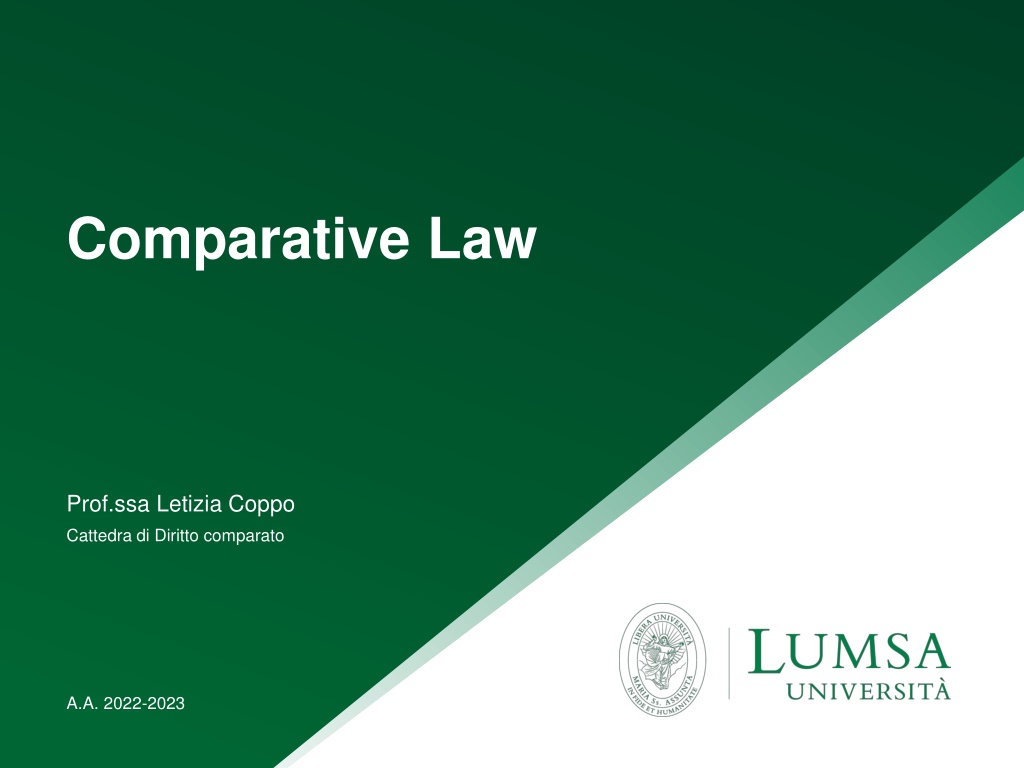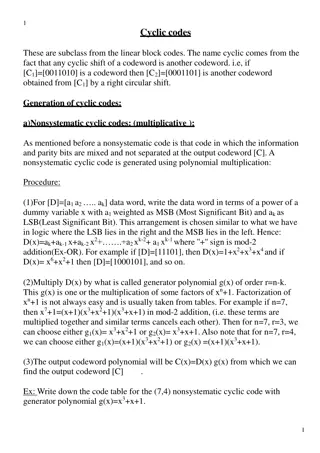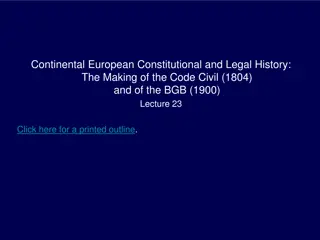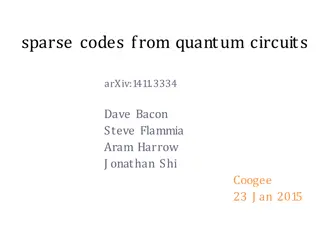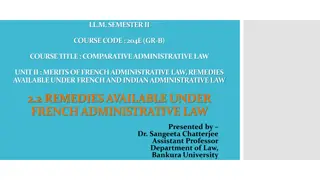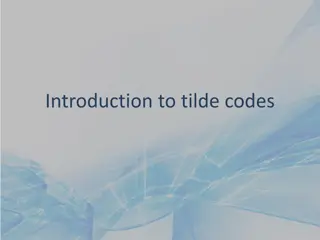Comparative Law: The French Civil Code and Main European Civil Codes
Prof.ssa Letizia Coppo explores the French Civil Code and main European civil codes, analyzing titles on publication, effects, application of legislation, persons, goods, property, ways to acquire property, sureties, and provisions applicable to Mayotte.
Download Presentation

Please find below an Image/Link to download the presentation.
The content on the website is provided AS IS for your information and personal use only. It may not be sold, licensed, or shared on other websites without obtaining consent from the author. Download presentation by click this link. If you encounter any issues during the download, it is possible that the publisher has removed the file from their server.
E N D
Presentation Transcript
Comparative Law Prof.ssa Letizia Coppo Cattedra di Diritto comparato A.A. 2022-2023
THE MAIN EUROPEAN CIVIL CODES C.C. FRAN AIS (1804) C.C. ALLEMAND (1900) C.C. ITALIEN (1865; 1942) C.C. ESPANOL (1889) TITRE PR LIMINAIRE: De la publication, des effets et de l application de la loi en g n ral TITRE PR LIMINAIRE: Dispositions sur la loi en g n ral TITRE PR LIMINAIRE: Des normes juridiques, leur application et effets LIVRE I: Des personnes LIVRE I: Partie g n rale (Allgemeinerteil) LIVRE I: Des personnes et de la famille LIVRE I: Des personnes LIVRE II: Des biens et des diff rentes modifications de la propri t LIVRE II: Droit des obligations (Recht der Schuldverh ltnisse) LIVRE II: Des successions LIVRE II: Des animaux, des biens, de la propri t et ses modifications LIVRE III: Des diff rentes mani res dont on acquiert la propri t LIVRE III: Droit de propri t (Sachenrecht) LIVRE III: De la propri t LIVRE III: Des diff rentes mani res dont on acquiert la propri t LIVRE IV: Des s ret s LIVRE IV: Droit de famille (Familienrecht) LIVRE IV: Des obligations LIVRE IV: Des obligations et des contrats LIVRE V: Dispositions applicables la Mayotte LIVRE V: Droit des successions (Erbrecht) LIVRE V: Du travail LIVRE VI: De la protection des droits 2 Universit LUMSA
THE FRENCH CIVIL CODE Ma vraie gloire n'est pas d'avoir gagn quarante batailles; Waterloo effacera le souvenir de tant de victoires; ce que rien n'effacera, ce qui vivra ternellement, c'est mon Code civil (Napol on) 4 Universit LUMSA
THE FRENCH CIVIL CODE The structure Preliminary title: of the publication, effects and application of legislation in general. Book I: of persons Book II: of goods and the different modifications of property Book III: of the different ways to acquire property. Book IV: of sureties Book V: provisions applicable to Mayotte 5 Universit LUMSA
THE FRENCH CIVIL CODE The structure PRELIMINARY TITLE it is focused on the sources of law, not on institutions that are common to the whole of private law, unlike the general part of the BGB. BOOK I it does not follow the chronological order of people s life or begins with the distinction between natural persons and legal persons, but it begins with the relationship between persons, as French citizens or nationals, and the State, in particular with civil rights and then with the French nationality and then the civil state. The book continues with marriage, of which some rules are contained in book III, divorce, filiation, parental authority, guardianship, the measures for the protection of incapable persons. What follows is the regime of cohabitation and the measures against domestic violence. 6 Universit LUMSA
THE FRENCH CIVIL CODE The structure BOOK II it begins with the classification of goods, as drawn by Roman law, and follows with the concept of property and other rights on land (usufruct, habitation, servitudes ) also coming from Roman law. Publicity in real estate records has no separate regime, but is contained in this very book. BOOK III title I is devoted to successions, II to liberalities, III to the sources of obligations (contract: preliminary provisions, formation, interpretation, effects, tort liability - which is atypical; other sources of obligations, like unjust enrichment), title IV is devoted to the general provisions on obligations, IV-bis to the proof of obligations, titles V-XVII to special contracts, the first of which is marriage. Title XX is devoted to time limitation of rights; title XXI comes back on the ways to acquire property providing original title ways (occupation, usucapion and possession stands for title). 7 Universit LUMSA
THE FRENCH CIVIL CODE The making of After the several drafts by Cambac r s, Napoleon appointed a commission of 4 persons (expert practitioners, not academics) for the final draft of the French Civil code. 2 representatives Pr ameneu of droit coutumier: Tronchet; Bigot de 2 representatives of droit crit: Portalis; Maleville After only 4 months, the Draft was ready. The text was divided into sections submitted to the legislative process separately. On the 31st March 1804 the Code Civil des Fran ais was promulgated 8 Universit LUMSA
THE FRENCH CIVIL CODE Napoleon s role He was an elegant and refined man, but also a concrete man, a soldier. He put an abrupt end to hair-splitting discussions. He advocated a simple and transparent drafting style, capable of making concepts intelligible also to non-experts He brought in the Code also his personal experience Idea of a strong patriarchal family to mirror the organisation of the State, with Napol on, as the father of the Nation, on top. Divorce for mutual consent (he divorced from Josephine Beauharnais) 9 Universit LUMSA
THE FRENCH CIVIL CODE The spirit and the essentials While Prussian and Austrian Codes were dictated by an enlightened despot, the French Civil code was a bourgeois Code, a product of the French Revolution. Nevertheless, it rested on a large number of traditional institutions, such as freedom of contract and ownership. 10 Universit LUMSA
THE FRENCH CIVIL CODE The spirit and the essentials The Code maintained some revolutionary achievements coming from droit interm diaire Equal division of estates Complete secularisation of marriage Abolition of feudal servitudes But it resized and downsized several rules It reduced the grounds for divorce It re-established the freedom of testament and donation, but within the limits of the quotit disponible . 11 Universit LUMSA
THE FRENCH CIVIL CODE The spirit and the essentials The Code reached a reasonable and balanced compromise between droit crit and droit coutumier. Droit crit: contract law; law of wills; dowry, contractual property regime was nearly modelled on Roman law. Droit coutumier: family and inheritance law; forced inheritance of relatives; community of movables; possession vaut titre. 12 Universit LUMSA
THE FRENCH CIVIL CODE The heritage The wide use of general clauses and open formula is what allowed the Code civil to survive (see abus de droit; clauses exon ratoires de la responsabilit ; law of delicts). 1. cole de l ex g se: grammatical and logical study of the Code. 2. cole interpretation of the Code in light of the needs expressed by society. de la libre recherche scientifique: 13 Universit LUMSA
THE FRENCH CIVIL CODE The reforms 2004 Divorce 2005 Filiation; sureties 2006 Successions and donations 2007 Legal capacity and guardianship 2008 Time limitation of rights 2009 Filiation 2013 Marriage (extension to PACS) 2016 Obligations and contract law 14 Universit LUMSA
THE GERMAN CIVIL CODE 1900, being unreformed until 2001 16 Universit LUMSA
THE GERMAN CIVIL CODE (BGB) The structure Book I. Allgemeiner Teil (general part) Book II. Recht der Schuldverh ltnisse (law of obligations) Book III. Sachenrecht (law of property) Book IV. Familienrecht (family law) Book V. Erbrecht (law of successions) 17 Universit LUMSA
THE GERMAN CIVIL CODE (BGB) The structure Book I. Allgemeiner Teil (general part): It does not contain general rules about the exercise of rights in society or basic principles in the construction of statutes, customary law, the powers of judges or burden of proof. Instead it contains certain basic institutions common to the whole of private law, which are recurring throughout all the other books of the BGB. 18 Universit LUMSA
THE GERMAN CIVIL CODE (BGB) The structure Book I. Allgemeiner Teil (general part): Division 1: persons Title 1: natural persons, consumers, entrepreneurs (it begins with legal capacity) Title 2: legal persons (divided into types: associations, foundations ) Division 2: things and animals (beginning with definitions and classifications, in line with Pandects) Division 3: legal acts (n goce juridiques) capacity to contract, declarations of will, contract, conditions and time periods, agency (on this see below). Division 4: time periods and dates Division 5: time limitation of rights Division 6: sureties 19 Universit LUMSA
THE GERMAN CIVIL CODE (BGB) The structure Pros and cons of Allgemeiner Teil The fact of providing rules in a preliminary and general part constantly raises doubts about their scope of application. Sometimes such a location can be misleading for novices and foreign lawyers, as they would expect to find certain rules in a different place. Great fascination on foreign jurists, mostly for teaching (see Saleilles, Austin and the Allgemeine Rechtlehre). 20 Universit LUMSA
THE GERMAN CIVIL CODE (BGB) Contract law and the evolution of the BGB It contracting parties are formally free and equal. is dominated by the bourgeois idea that Key principles: freedom of contract/party autonomy and the duty to keep one s promises. Voidness when the contract is against bonos mores or if one party unfairly exploited the inexperience or lack of judgment of the other. 21 Universit LUMSA
THE GERMAN CIVIL CODE (BGB) Contract law and the evolution of the BGB The code proved inadequate to face social challenges as the bourgeois state democracy. gave way to the social Judges and legislators had to qualify and limit the liberal principles of contract law, wherever they gave one party the power to threaten the basic conditions for a decent life which must be guaranteed by the social state. Legislators general clauses. enacted special statutes; judges used 22 Universit LUMSA
THE GERMAN CIVIL CODE (BGB) Contract law and the evolution of the BGB Legislative tenancies, agricultural holdings and most of all labour. interventions: special statutes on housing, General clauses: Treu und Glaube (Good faith); rebus sic stantibus; abuse of rights; Wegfall der Gesch ftsgrundlage (Fall of the ground of the transaction); prohibition of venire contra factum proprium. Applications: control on liability limitation clauses in GTC; impossibility to perform (Unzumutbarkeit, Unm glichkeit); duties of protection (Schutzpflichten). 23 Universit LUMSA
THE GERMAN CIVIL CODE (BGB) The making of In 1874 a first commission was appointed for the drafting of the Code, composed of 11 members (judges, officials of the Ministry, Professors, among which Windscheid, but no lawyers). The consultation. The first draft was published 13 years after, in 1887. commission worked in seclusion, without any public As soon as the draft was published, it had been subject to bitter criticism due to its scholastic structure, abstract conceptualism, accurate but hardly accessible legal wording and complex system of cross-references. A second commission was appointed in 1890, including few layman, but no major changes were made. 24 Universit LUMSA
THE GERMAN CIVIL CODE (BGB) The spirit and essentials The BGB was enacted in a period of relative social and political stability, so their spirit is retrospective and reflective, conservative: it seeks to maintain a situation favourable to the establishment. The BGB reflects the social model of Bismark s Empire: he was a liberal bourgeois who created the German nation by cooperating with Prussia s conservative authoritarianism. The Code was infused with a marked liberalism and the belief that the general good would spontaneously flow from the interplay of economic forces, provided that the State did not interfere. But the drafters of the BGB were blind to the great social changes and challenges that were affecting Germany between the 1870s and 1880s. 25 Universit LUMSA
THE GERMAN CIVIL CODE (BGB) The spirit and essentials Language, method and conceptual structure: it came from Pandectist school. The BGB is not addressed to citizens, but to lawyers; it waived whatever ambition of educating its lay readers. Key-words: accuracy and rigour of thought; clarity; exhaustiveness; but complex syntax and sometimes gothic style. The BGB was the legal calculating machine par excellence . 26 Universit LUMSA
THE GERMAN CIVIL CODE (BGB) The heritage: the teaching of private law by categories 1. Persons 2. Goods 3. Acts/facts 4. Relationships 5. Occurrences extinctive) (constitutive, modificative, 6. Qualities 27 Universit LUMSA
THE GERMAN CIVIL CODE (BGB) The heritage: the teaching of private law by categories Subjective legal positions POSITIONS ACTIVES POSITIONS PASSIVES Right Duty or obligation Legitimate interest Expectation Potestative right / power / authority Subjection Faculty Burden Status Status 28 Universit LUMSA
THE GERMAN CIVIL CODE (BGB) The heritage: the teaching of private law by categories Legal facts: all event that produces legal effects. Material facts: events being independent from human will the occurrence of which produces a modification of reality with legal consequences (birth, death ). Legal acts: any human action or omission for which the system provides legal effects. Legal acts stricto sensu: any human act which is undertaken consciously and willingly, the effects of which are not dependent from human will but from the law (letter of formal notice, payment of a debt). N goces juridiques: any declaration through which persons express their will to regulate their interests in a certain way and produce certain legal effects (contract, testament, marriage ). Declarations of science: any declaration through which persons communicate the knowledge of a fact or situation which is legally relevant (confession, acknowledgement of paternity ). 29 Universit LUMSA
THE GERMAN CIVIL CODE (BGB) The heritage: the general theory of negozio giuridico Starting point: contract, marriage, testament, exc., all share the feature of being declarations of will (unilateral, bilateral or multilateral) through which the persons announce the legal effects that they want to obtain (transfer of property, transfer of assets after death ). In all those cases the person s will produces legal effects by creating, modifying or ending a certain legal situation. Definition: the legal n goce is a declaration of will through which a person announces the legal effects pursued and to which the legal system connects the production of the desired effects, provided that they are compliant with the legal ordering itself. 30 Universit LUMSA
THE GERMAN CIVIL CODE (BGB) The heritage: the general theory of negozio giuridico We haven t got, either in the French or in the Italian civil code, any provisions on the n goce juridique; it is not a normative category but it is very important from a theoretical viewpoint. Instead, we have provisions on contract law in general, that are applicable, as long as compatible, also to unilateral acts. Classification of n goces juridiques As to their structure: unilateral, bilateral, multilateral, collegial, complex acts As to their function: mortis causa/inter vivos; patrimonial (onerous or gratuitous)/non patrimonial; acts of disposition (translative, abdicative, constitutive) or acts of obligation; acts of ascertainment 31 Universit LUMSA
THE GERMAN CIVIL CODE (BGB) The heritage: the general theory of negozio giuridico The elements of n goce juridique: essential elements: their lack makes the act invalid; ancillary elements: their presence or absence has an impact only on the effectiveness of the contract; natural elements: they are legally typical for certain acts, so they apply as defaults, whenever they are not derogated from by the parties. 32 Universit LUMSA
THE GERMAN CIVIL CODE (BGB) The heritage: the general theory of negozio giuridico The pillar of n goce juridique: the declaration of will 1) Tacit declaration 2) Express declaration Oral form Written form ad sustantiam (i.e. for validity) or ad probationem (i.e. for evidence) Bound under seal (forme crite solennelle) Conventional form 3) Silence 33 Universit LUMSA
THE GERMAN CIVIL CODE (BGB) The heritage: the general theory of negozio giuridico The pillar of negozio giuridico: the declaration of will - The problem of the defects of consent - The problem, of publicity of legal acts: constitutive publicity, declarative publicity, informative publicity. 34 Universit LUMSA
Prof.ssa Letizia Coppo Email: l.coppo1@lumsa.it lcoppo@univ-catholyon.fr
